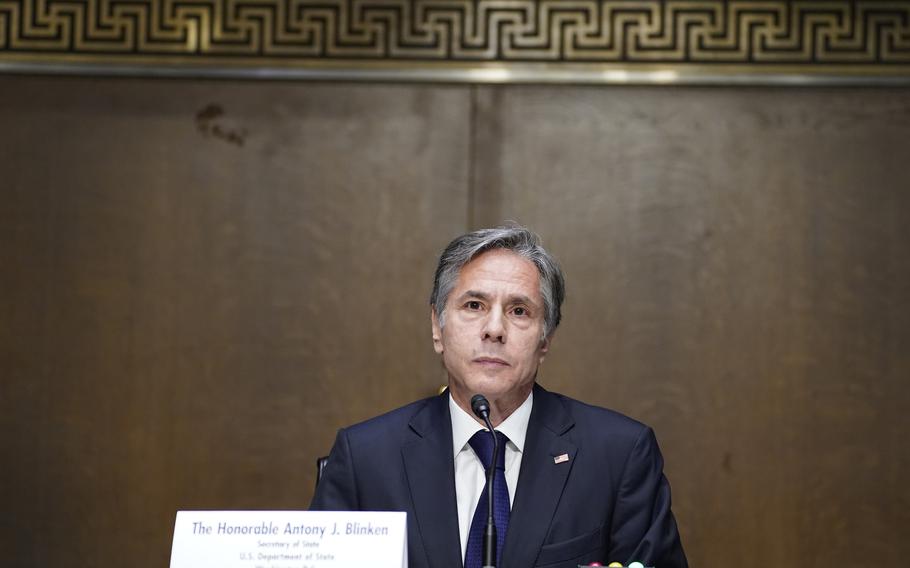Americas
Biden administration expected to ink new security agreement with Mexico
Los Angeles Times October 7, 2021

U.S. Secretary of State Antony Blinken listens during a Senate Foreign Relations Committee hearing Sept. 14, 2021, on Capitol Hill in Washington, D.C. (Kent Nishimura/Los Angeles Times/TNS)
MEXICO CITY (Tribune News Service) — The Biden administration is expected this week to reach a security deal with Mexico that takes aim at the most dangerous drug cartels and migrant smugglers while jettisoning a previous agreement that Mexican officials have criticized for exacerbating violence tied to the narcotics trade.
The deal is slated to be announced Friday to mark the arrival in Mexico City of a high-level delegation of U.S. officials that will include Secretary of State Antony J. Blinken, Homeland Security Secretary Alejandro Mayorkas and Attorney General Merrick Garland, according to people familiar with the matter.
“In matters of security, there has to be a new chapter,” Mexican Foreign Minister Marcelo Ebrard told reporters here Tuesday.
The leftist government of President Andrés Manuel López Obrador has been especially contemptuous of an agreement reached in 2008 between the Obama administration and the government of Mexican President Felipe Calderon, a bitter rival of López Obrador.
The multimillion-dollar initiative became the latticework of a vast U.S.-Mexico joint effort to fight drug trafficking, share military intelligence, revamp Mexico’s law enforcement agencies and its judiciary, and seek to improve government accountability. Known as the Merida Initiative, the deal for more than a decade has served as the foundation of U.S. security policy in Mexico.
The deal was heavy on hardware, military action and the so-called kingpin strategy — killing or capturing the leaders of drug cartels hoping that would cause their organizations to fold. It didn’t turn out that way — the cartels had deep benches, and new leaders were frequently more violent than their predecessors, Mexican authorities have said.
It is time, Ebrard said, “to leave the Merida Initiative behind.” Its premises are foreign to what the current Mexican government is attempting to achieve in public security, he said.
The emerging security strategy has not been detailed, and authorities on both sides of the border face a daunting task: Violence and murder rates across Mexico have soared in recent years, whether related to drug trafficking, human smuggling or street crime.
People familiar with U.S.-Mexico discussions said the new strategy will likely focus more heavily on targeting the cartels’ finances and activities in the U.S. Mexico is asking the U.S. to extradite more suspects, the people said, to more assert its sovereignty. So far, most extraditions go north from Mexico to the U.S., not the other way around.
Mexican officials are also sure to press the U.S. to stanch the flow of firearms being smuggled into their country. About 70% of all weapons confiscated in Mexico can be traced to U.S. sources, Mexican officials have said.
The U.S., meanwhile, hopes that Mexico will stiffen resistance to smugglers to reduce the arrivals of illegal immigrants to the U.S. southern border, where the numbers have broken records in recent months.
The Trump and Biden administrations have pressured Mexico to block the flow of people from Central America attempting to reach the U.S. border. Mexico’s record on that score has been spotty, and in recent weeks U.S. officials scrambled to handle an influx of Haitian migrants in Del Rio, Texas.
The U.S. officials are also expected to seek Mexico’s help in curbing illicit shipments to the U.S. of fentanyl, a powerful and often deadly synthetic opioid.
Outside experts said the new framework is badly needed because U.S. and Mexican officials were deeply unsatisfied with how the Merida initiative was working.
“The U.S. side recognizes that a once-strong cooperation has been in decline,” said Andrew Selee, a Mexico expert who is president of the Migration Policy Institute in Washington. “It needs new energy.”
Roberta Jacobson, a former U.S. ambassador to Mexico and formerly the top State Department official for Latin America, agrees Merida became outdated but believes it had success until recent changes.
“This cooperation has eroded in recent years, and with it the utility of Mérida,” she said during an online chat with the InterAmerican Dialogue.
Nevertheless, she said, the agreement created an unprecedented and valuable “culture of cooperation.”
“Mexico and the United States must redefine their security priorities for a new binational strategy — one that respects sovereignty and responds to the actual causes of insecurity,” she said.
The troubled security partnership hit a low point last year when the U.S. arrested former Mexican Defense Minister Salvador Cienfuegos on drug trafficking charges as he traveled in California. Mexican officials said they were not informed of the arrest, and protested vehemently. Eventually, the U.S. relented and sent him to Mexico, where he was released without charges. Mexico, as a reaction, imposed new restrictions on the ability of foreign agents to operate in Mexico.
Blinken and his colleagues will have to tackle that lingering mistrust, said Andrew Rudman, head of the Mexico Institute at the Wilson Center, a nonpartisan think tank in Washington.
“Confidence and trust have to be restored,” he said. “The most important thing is they’re talking, restoring a dialogue after so much damage.” (Times staff writer Wilkinson reported from Washington and special correspondent Sanchez from Mexico City.) ©2021 Los Angeles Times. Visit at latimes.com.
Distributed by Tribune Content Agency, LLC.